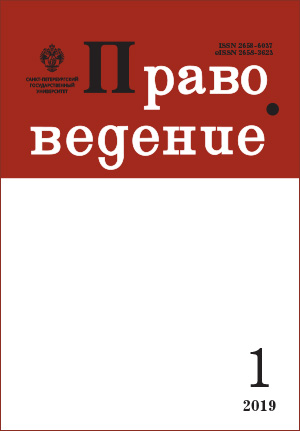Torture and other forms of ill-treatment in criminal cases of the European Court of Human Rights
DOI:
https://doi.org/10.21638/spbu25.2019.109Abstract
In criminal proceedings, respect for the honor and dignity of the individual is considered as one of the fundamental principles of criminal proceedings, proclaimed as such in a separate article of the Criminal Procedural Code of the Russian Federation. At the same time, coercion is represented by the condition of attaining the objectives of criminal procedural activities. Based on the provisions of the Constitution of the Russian Federation, the legislation of the Russian Federation, the decisions of the Сonstitutional Court of the Russian Federation, the provisions of international legal acts, first of all, the Convention on the Protection of Human Rights and Fundamental Freedoms of November 4, 1950, and the legal positions of the European Court of human rights, approaches to the distinction between the concept of “torture” and other forms of ill-treatment are analyzed. The Russian Federation has ratified a number of international treaties aimed at protecting against torture, some of which have been implemented in national legislation. However, the concept of “torture” and the difference between torture and other forms of ill-treatment are not disclosed in Russian legislation. This makes it difficult to assess the act correctly. Attention is drawn to the fact that the Convention for the Protection of Human Rights and Fundamental Freedoms of 4 November, 1950 strengthens the absolute and unconditional prohibition of torture. At the same time, the Convention for the Protection of Human Rights and Fundamental Freedoms of 4 November 1950 article 3 merely distinguishes between “torture”, “inhuman treatment or punishment” and “degrading treatment or punishment”. In this regard, it is the analysis of the decisions of the European Court of Human Rights that allows us to get closer to their understanding. The analyzed approaches of the European Court of Human Rights do not contradict the concepts of “torture” and other cruel, inhuman or degrading treatment or punishment, which are used in the text of a number of international acts. The analysis allows us to further understand such concepts as “cruel treatment”, “torture”, “inhuman treatment or punishment”, “degrading treatment or punishment” used in legislation and international legal acts. However, the author does not set as his goal an analysis of the criminal law aspects of the problem under consideration.
Keywords:
punishment, torture, cruel treatment, inhuman treatment, degrading treatment, criminal proceedings, detention
Downloads
References
References
Danilova, Natal’ia A., Nikolaeva, Tat’iana G. 2014. On the question of the admissibility of coercion at the stage of criminal proceedings. Izvestiia Irkutskoi gosudarstvennoi ekonomicheskoi akademii 6: 73–77. (In Russian)
Pisarev, Aleksandr V. 2002. Production of investigative actions that restrict the right of citizens to personal integrity. PhD in Law thesis. Omsk, Omskaia akademiia MVD Rossii Publ. (In Russian)
Smol’kova, Iraida A. 2018. Is it permissible to use coercion in the course of examination in Russian criminal proceedings? Ugolovnoe pravo 3: 122–128. (In Russian)
Tskhovrebova, Ilona. 2014. Physical coercion as an independent measure of procedural coercion. Dopros: protsessual’nye i kriminalisticheskie problem 2: 317–327. Moscow, Akademiia upravleniia Ministerstva vnutrennikh del Rossiiskoi Federatsii Publ. (In Russian)
Umnova, Irina, Stal’nova, Anastasi’a S. 2016. The constitutional principle of respect for human dignity: General approaches to legal understanding and Russian constitutional practice. Konstitutsionnoe i munitsipal’noe pravo 10: 15–20. (In Russian)
Vilkova, Tat’iana Iu. 2015. Principles of criminal proceedings in Russia: legal basis, content, guarantees. Moscow, Iurlitinform Publ. (In Russian)
Vilkova, Tat’iana Iu. 2015. The principle of respect for the honor and dignity of the individual in criminal proceedings: legal basis, content, guarantees. Advokatskaia praktika 5: 6–12. (In Russian)
Vilkova, Tat’iana Iu. 2017. The principle of presumption of innocence: history, modernity, prospects. Moscow, Iurait Publ. (In Russian)
Voskobitova, Lidiia A. 2013. Adversarial and accusatory bias in criminal proceedings. Sovremennye problemy razvitiia ugolovnogo protsessa, kriminalistiki, operativno-rozysknoi deiatel’nosti: 17– 24. Moscow, Akademiia General’noi prokuratury RF Publ. (In Russian)
Downloads
Published
How to Cite
Issue
Section
License
Articles of "Pravovedenie" are open access distributed under the terms of the License Agreement with Saint Petersburg State University, which permits to the authors unrestricted distribution and self-archiving free of charge.




